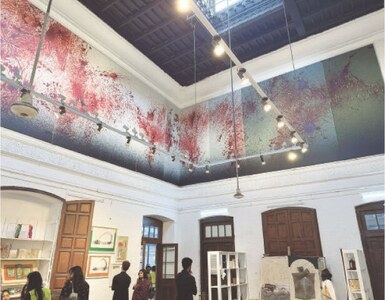
Rituals ranging from drowning effigies of the goddess of winter, to throwing bread rolls from a hilltop, mark the end of winter for Europeans. Understandable. Spending all winter cursing the ice-choked roads and skin-numbing cold, people find a way to vent out their frustration and celebrate the arrival of spring.
Similarly, as the calendar flips to March 13, the residents of the Keran, Dowariyan and Neelum Valley in the Pakistan-administered Kashmir celebrate the centuries-old Sheshar festival to mark the arrival of spring after the hardship endured in winter. The festival is also celebrated across the Line of Control in India-occupied Kashmir.
‘Sheshar’ is a Kashmiri word for the hardship that the below-freezing winter temperatures bring for the region’s inhabitants. Snowstorms often lead to road closures, making it impossible to commute to the market or to the hospital in an emergency.
To celebrate the Sheshar this year, a three-day Sheshar Mela [fair] was organised by the Pakistan Army and the Neelum Guest House Association. Locals and tourists who attended enjoyed watching the tug-of-war, race and kabaddi competitions held for the village boys.
A unique, centuries-old festival in the Kashmir region marks the end of winter
“More people celebrated the festival this year compared to last year,” says 40-year-old Raja Iftikhar, president of the Neelum Guest House Association. “It could be because of the relaxed pandemic protocol this year.”

But 46-year-old Raja Ilyas, a political figure from Neelum Valley who has been organising and participating in the Sheshar festival for many years, feels that people are slowly moving away from their culture.
“Sheshar is our cultural event and culture is the identity of any region,” he says. “Some people don’t celebrate Sheshar as they believe that it contradicts their religious beliefs. Another reason could be that, because of climate change, winters are becoming less severe, so the celebration spirit is not the same when spring arrives.”
To begin the festivities, the village boys get a hold of old shoes that they bring from their homes and tie them together with rope. These shoes are then taken from house to house in the village, with the boys chanting that winter is over and spring has arrived.
As the residents of the house come out to greet the boys, they receive fresh spring flowers in exchange for an old shoe that gets added to their collection. Apart from flowers, the boys also give the residents a guchhi mushroom, a wild-growing local delicacy that cannot be cultivated commercially. It is considered a symbol of spring.

The boys are also given food items such as rice, sugar and ghee as well as money by each household. Not giving the boys some food or cash along with an old shoe is considered a bad omen.
Giving away an old shoe signifies getting rid of hardships endured in winter. Before giving them away, the shoes are brushed in all the four corners of the house to remove the evil eye, or any bad luck, from the house. The locals believe that throwing these old, worn-out shoes far away from their houses means removing all pain, hardships and negativity from their lives.
The old shoes taken away from the villagers are kept in a specially allocated, dry place in the village, known as Sheshar mora. It is believed that if shoes become soaked in rain or otherwise, then even in spring, there might be rain and unpleasant weather, creating difficulties for people.
“We look forward to the festival every year,” says 13-year-old Hasnain, a participant. “The funniest part is the slogans that we chant as we go to people’s houses. Since in winter, we are mostly house-bound and cannot go out to play because of harsh weather, the arrival of spring is no less than a festival for us, because it means we can meet our friends and run around.”
Once the shoe collection is over and they are stored away, the young boys participate in competitions or a race. The boy who wins the race becomes the ‘father’ of Sheshar, while the last one to cross the finishing line becomes the ‘mother’ of Sheshar. The boys are addressed by their new titles for the whole year.

As the festivities come to an end, the rice, ghee and sugar collected from all the homes is consolidated and the boys prepare a sweet rice dish for everyone to eat.
Interestingly, feet and shoes are associated with good and bad luck in other cultures too. The custom of removing shoes before entering a home is a mark of respect in Japan but is also traditionally practised elsewhere, from Scandinavia to Hawaii.
According to traditional Feng Shui, neither shoes nor slippers should be left lying outside the main door of the house. It is believed that the chi (energy) rides with the wind, collects all the smells from discarded footwear and carries them into the house, causing illness. In Japanese houses there is a raised border to prevent this from happening. A shoe rack is associated with wealth and good luck.
Whether it is around shoes, mushrooms or flowers, festivals such as Sheshar contribute to feelings of social cohesion within communities. These cultural and ethnic celebrations bring together community elders who share stories and their experiences, while younger people are involved in activities in which the entire village participates. This builds and sustains bonds between the community.
The writer is a freelance environmental journalist based in Muzaffarabad.
He tweets @sajidmir44
Published in Dawn, EOS, April 17th, 2022


































